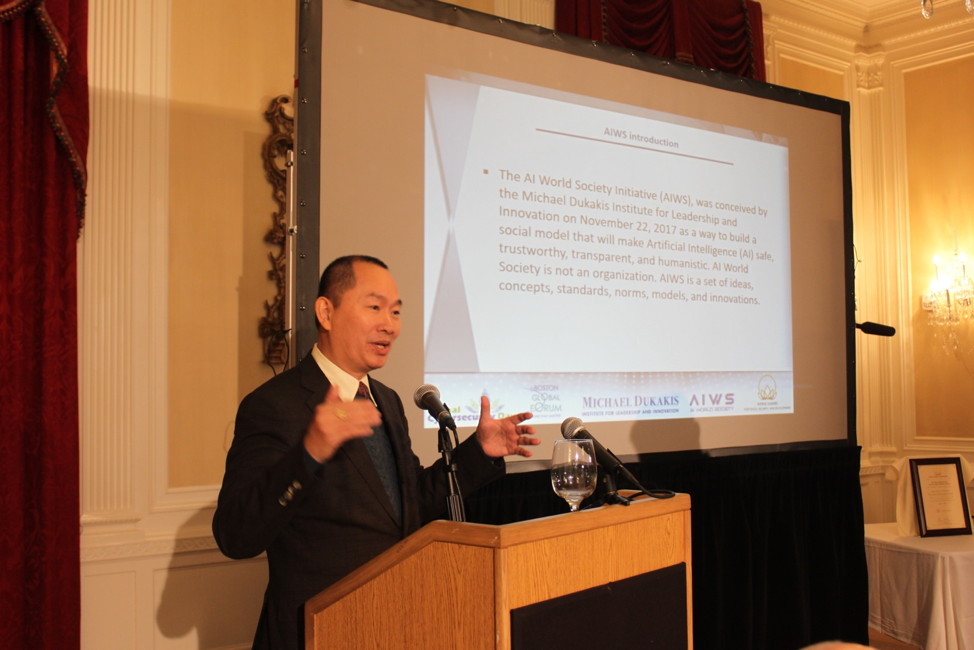
by Editor | Jul 5, 2021 | News
AIWS seeks to create an AIWS Ecosystem that empowers citizens to create value for themselves, for others, and for society through the application of artificial intelligence, digital, blockchain, and data science technologies. It is a sharing ecosystem that rewards both the creators and users of these technologies, as well as an ecosystem that encourages everyone to innovate. It breaks down the hierarchies that traditionally have created unequal power relationships, paving the way to a sharing society. It recognizes the value of every citizen, as well as every citizen’s creative potential. It seeks to promote citizens’ economic wellbeing while also promoting ethical and community values. It aims for nothing less than the creation of a more trusting, prosperous, and compassionate world where people can live more fulfilling lives, materially and ethically.
The foundation of AIWS is the Social Contract for the Artificial Intelligence Age, which was developed by the Boston Global Forum in consultation with leading thinkers and practitioners. The Social Contract has been endorsed by organizations, including The World Leadership Alliance – Club de Madrid, which is the organization of former heads of state and heads of government of democratic countries.
As with earlier social contracts, the Social Contract for the Artificial Intelligence Age is rooted in the rights and interests of individuals, and what governments and other entities must do and are prohibited from doing to safeguard these rights and interests. The AI Social Contract and AIWS Ecosystem envision a world where everyone’s contribution is recognized and everyone has a right to education and ready access to information and technology, where no one is above the law, and where integrity, knowledge, creativity, and honesty are seen as key values in shaping policy and society. It envisions a world where governments adhere to basic values and are accountable and transparent.
The AIWS Value System
Remaking the world as a more humane, peaceful, and secure place rests on promoting the values that will foster that world. To that end, AIWS has created the AIWS Value System as a means of guiding and encouraging individuals to contribute to a changing world.
The AIWS Value System focuses on creative or innovative acts that foster a sharing society. Such acts can take many forms but would include:
– Creation or promotion of innovative ideas and organizations that offer meaningful paths for people’s political, social, economic, or moral development
– Creation or invention of technological advances that improve the lives of ordinary people
– Innovative approaches to art, culture, sport, or entertainment that improve the quality of life for ordinary people
– Voluntary acts – everything from charitable contributions to the granting of access to data – that enhance the lives of ordinary people
– Acts that promote the values inherent in the Social Contract for the Age of Artificial Intelligence
As these examples indicate, the AIWS Value System centers on action designed to help ordinary people and that contributes to the building of a sharing society.
Promoting the AIWS Value System
The AIWS Value System recognizes acts that often take place in the absence of supportive mechanisms. Yet, the creation of such mechanisms can incentivize and facilitate acts of this kind. To this end, AIWS is:
– creating the Global Enlightenment Education Program. This program will aim to inform ordinary citizens about the world in which they live, and how they can help improve it. The program will be dedicated to lifelong learning and the fostering of views that will enable ordinary citizens to be more innovative, tolerant, and participatory. The program will place special emphasis on reaching people in more remote areas who are typically left behind by technological change. The program will also emphasize the contribution that everyone, whatever their location or background, can make to the common good.
– promoting the development of legal systems that protect creativity and innovation and that respect the rights and interests of ordinary people.
– promoting creation of a cultural, social, economic, and political environment that encourages and rewards creativity and innovation; that respects the rights, interests, and abilities of ordinary people; that encourages popular participation in the creation of a more humane world; that rewards those individuals who make noteworthy creative and innovative contributions to the common good; and that recognizes those who, through ideas and action, make significant contributions to politics and society.
– promoting the development of technology systems that support creativity and innovation; that broaden participation by ordinary citizens; that contribute to the digital-age education of these citizens; that give ordinary citizens the means to directly create products and services; that foster meaningful work opportunities; that provide ordinary citizens with greater access to essential services, such as health care; and that suppress fraudulent and other harmful acts that injure ordinary citizens.
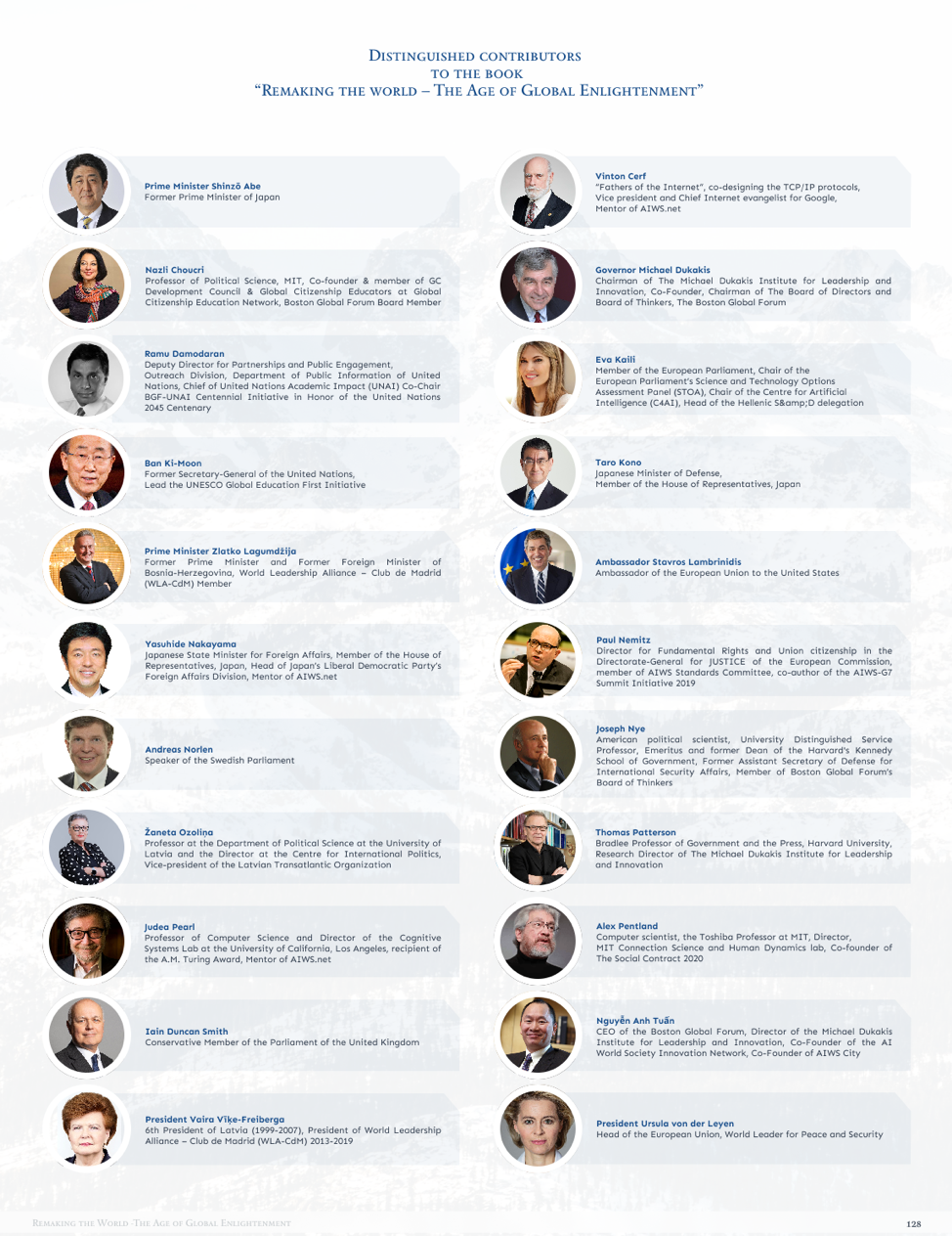
by Editor | Jul 5, 2021 | Event Updates
On July 1, 2021, Remaking the World – The Age of Global Enlightenment was officially made available. This book is a collaboration between the Boston Global Forum (BGF) and the United Nations Academic Impact (UNAI) as a part of the United Nations Centennial Initiative. The official announcement of the book was organized on May 27, 2021.
The book proposes pathways toward a more humane, peaceful, and secure world, largely by harnessing the potential of Artificial Intelligence (AI), blockchain, and other Digital Age technologies. A key proposal is the adoption of an AI International Accord that would bind nations to constructive uses of AI and prohibit destructive uses. The book proposes a Social Contract for the AI Age as the theoretical and ethical foundation of the Accord. The book also proposes the AI World Society (AIWS) as a vehicle through which individuals and civic organizations can help foster an Age of Global Enlightenment.
AIWS seeks to create an AIWS Ecosystem that empowers citizens to create value for themselves, for others, and for society through the application of artificial intelligence, digital, blockchain, and data science technologies. It is a sharing ecosystem that rewards both the creators and users of these technologies, as well as an ecosystem that encourages innovation. It breaks down the hierarchies that traditionally have created unequal power relationships, paving the way to a sharing society. It recognizes the value of every citizen, as well as every citizen’s creative potential.
Governor Michael Dukakis, Co-founder and Chair of Boston Global Forum, states that “the book is significant contribution of BGF and UNAI to shape peace, security, and prosperous world in the AI and Digital Age. Thank Editor Nguyen Anh Tuan for his excellent work for this book and the United Nations Centennial Initiative as well as AI World Society (AIWS).”
Ramu Damodaran, Chief of the United Nations Academic Impact and Co-Chair of the United Nations Centennial Initiative, said on the May 27, 2021, book launching event, “The United Nations Academic Impact is proud to join the Boston Global Forum in an initiative that looks to the 2045 centennial as an opportunity to reframe the possibilities inherent in the United Nations while remaining true to the power of its promise a century earlier.”
The book is free to download from July 15, 2021, at https://un100.net/books-un/
or at https://bostonglobalforum.org/bgf2022/publications/ai-world-society/
or send email to [email protected]
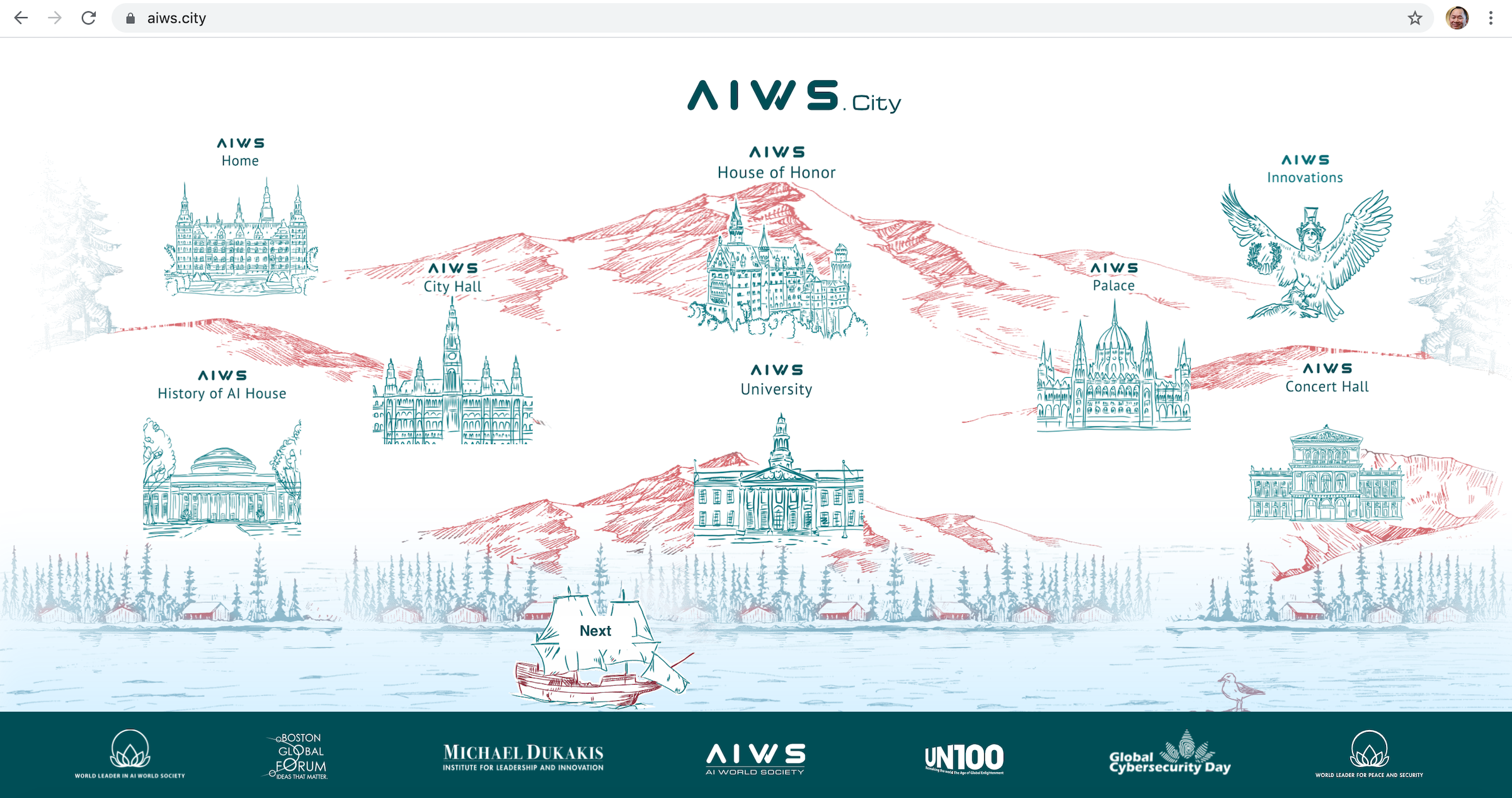
by Editor | Jul 5, 2021 | Publications
Apply AIWS Ecosystem at AIWS City: A Model for the Digital Age
Nguyen Anh Tuan
The Digital and AI Age is remaking the world. The issue is whether that remaking will serve the common good. Judging from history, it is a mistake to assume that such an outcome will occur without empowering ordinary citizens. The Artificial Intelligence World Society (AIWS) is such an effort.
In this article, I discuss the need to empower citizens and the steps required to achieve that goal. The article concludes with a discussion of AIWS City, which is a digital city being created as a model for how ordinary people can be empowered in the Digital and AI Age.
The Goal of AIWS
AIWS seeks to create an AIWS Ecosystem that empowers citizens to create value for themselves, for others, and for society through the application of artificial intelligence, digital, blockchain, and data science technologies. It is a sharing ecosystem that rewards both the creators and users of these technologies, as well as an ecosystem that encourages everyone to innovate. It breaks down the hierarchies that traditionally have created unequal power relationships, paving the way to a sharing society. It recognizes the value of every citizen, as well as every citizen’s creative potential. It seeks to promote citizens’ economic wellbeing while also promoting ethical and community values. It aims for nothing less than the creation of a more trusting, prosperous, and compassionate world where people can live more fulfilling lives, materially and ethically.
The foundation of AIWS is the Social Contract for the Artificial Intelligence Age, which was developed by the Boston Global Forum in consultation with leading thinkers and practitioners. The Social Contract has been endorsed by organizations, including The World Leadership Alliance – Club de Madrid, which is the organization of former heads of state and heads of government of democratic countries.
As with earlier social contracts, the Social Contract for the Artificial Intelligence Age is rooted in the rights and interests of individuals, and what governments and other entities must do and are prohibited from doing to safeguard these rights and interests. The AI Social Contract and AIWS Ecosystem envision a world where everyone’s contribution is recognized and everyone has a right to education and ready access to information and technology, where no one is above the law, and where integrity, knowledge, creativity, and honesty are seen as key values in shaping policy and society. It envisions a world where governments adhere to basic values and are accountable and transparent.
The AIWS Value System
Remaking the world as a more humane, peaceful, and secure place rests on promoting the values that will foster that world. To that end, AIWS has created the AIWS Value System as a means of guiding and encouraging individuals to contribute to a changing world.
The AIWS Value System focuses on creative or innovative acts that foster a sharing society. Such acts can take many forms but would include:
– Creation or promotion of innovative ideas and organizations that offer meaningful paths for people’s political, social, economic, or moral development
– Creation or invention of technological advances that improve the lives of ordinary people
– Innovative approaches to art, culture, sport, or entertainment that improve the quality of life for ordinary people
– Voluntary acts – everything from charitable contributions to the granting of access to data – that enhance the lives of ordinary people
– Acts that promote the values inherent in the Social Contract for the Age of Artificial Intelligence
As these examples indicate, the AIWS Value System centers on action designed to help ordinary people and that contributes to the building of a sharing society.
Promoting the AIWS Value System
The AIWS Value System recognizes acts that often take place in the absence of supportive mechanisms. Yet, the creation of such mechanisms can incentivize and facilitate acts of this kind. To this end, AIWS is:
– creating the Global Enlightenment Education Program. This program will aim to inform ordinary citizens about the world in which they live, and how they can help improve it. The program will be dedicated to lifelong learning and the fostering of views that will enable ordinary citizens to be more innovative, tolerant, and participatory. The program will place special emphasis on reaching people in more remote areas who are typically left behind by technological change. The program will also emphasize the contribution that everyone, whatever their location or background, can make to the common good.
– promoting the development of legal systems that protect creativity and innovation and that respect the rights and interests of ordinary people.
– promoting creation of a cultural, social, economic, and political environment that encourages and rewards creativity and innovation; that respects the rights, interests, and abilities of ordinary people; that encourages popular participation in the creation of a more humane world; that rewards those individuals who make noteworthy creative and innovative contributions to the common good; and that recognizes those who, through ideas and action, make significant contributions to politics and society.
– promoting the development of technology systems that support creativity and innovation; that broaden participation by ordinary citizens; that contribute to the digital-age education of these citizens; that give ordinary citizens the means to directly create products and services; that foster meaningful work opportunities; that provide ordinary citizens with greater access to essential services, such as health care; and that suppress fraudulent and other harmful acts that injure ordinary citizens.
Test Model: AIWS City
The AIWS Value System is innovative and, as such, untested for its utility. AIWS will test the concept by creating the AIWS City, which will be a virtual digital city dedicated to promoting the values associated AIWS. We envision it as a community of scholars, innovators, leaders, and citizens dedicated to fostering thought, creativity, and ethical behavior.
The digital platform for AIWS City has been created and the first phase of the project will be launched on September 9, 2021. AIWS City has offices in Boston, Massachusetts (USA); Tokyo (Japan), and NovaWorld Phan Thiet, Ha Noi, and Nha Trang (Vietnam), with plans to expand to other locations at a later time.
AIWS City will include the following components:
– AIWS Home, which is the personal space of the “citizens” of AIWS City. Each citizen will have a “digital home” for their work, innovation, and entertainment. The digital home will have secure computing, data storage, and Cloud service, as well as access to data sets, software programs, and tech support.
– AIWS University, which is a digital-age university for lifelong learning. The university will focus on courses that help leaders, managers, and students understand and apply digital technology, including Artificial Intelligence, cybersecurity, machine learning, and blockchain. It will also include courses designed to give individuals an understanding of the larger world of which they are a part. A signature feature of the university will be its course offerings in leadership, which emphasize ethical, compassionate, team-centered, and socially responsible leadership in the Digital Age.
– AIWS Global Enlightenment Education Program, which was described earlier in this article. Citizens of AIWS City will receive a daily bulletin with information and ideas that can enhance their global understanding and enrich their personal lives.
– AIWS Forum, which will feature lectures by the world’s leading digital thinkers – scholars, innovators, philanthropists, political leaders, artists, and corporate executives. There will also be seminars and discussion groups designed to bring together communities of interest. This Forum will promote AIWS Ecosystem and AIWS Value System.
– AIWS Vint Cerf Museum of the Internet, which is named after Vint Cert, who is “the father of the Internet” and a frequent contributor to the Boston Global Forum and AIWS. The museum will be interactive and trace the history of the Internet, including the contributions of Vint Cerf and other major figures in the Internet’s development.
– AIWS History of AI House, which will display the history of AI and serve as a venue for deliberation on issues relating to AI.
– AIWS Market, which will feature products and services that promote a healthy, ethical, and productive lifestyle. The market will also serve as a small business incubator, assisting these businesses in building their brand and entering the digital market. The market will support the sale of creative and innovative products and services that promote the common good.
– AIWS College Preparatory Academy, which will assist students from developing countries to prepare for and gain admission to high-quality colleges and universities.
– AIWS Innovation Hub, which will serve as an incubator to help firms, inventors, innovators, and entrepreneurs turn their ideas into reality. They will be able to discuss their ideas and problems and hear from experts and practitioners on how to advance or solve them. The Innovation Hub will promote pioneering models that foster social responsibility and will reward their developers through the AIWS Rewards Program.
-AIWS Window on the World, which will provide AIWS citizens with virtual tours of the world’s great museums, concert halls, palaces, public buildings, stadiums, ancient ruins, landmark buildings, and natural wonders. And it will give them opportunities to interact with creative individuals from these venues.
AIWS Rewards Program, which will be an experimental program to test the feasibility of a value marketplace – a mechanism through which societal contributions can be exchanged for goods and services. Based on a cryptocurrency (Crypto-AIWS-Rewards), the program will seek to help reformers, innovators, artists, and others who contribute to human progress but who typically do not receive commensurate material benefits.
Remaking the World Requires Reimagining It
The great question of the Digital and AI Age is not technological in nature. Rather it is the question of what type of society we seek to create through the application of digital technology.
The digital and AI revolution and trailblazing ideas will reshape the world. Like previous industrial revolutions, it will have a transformative effect on the way we live and relate to each other. Like the others, it will be disruptive. Some business sectors will wither, while others will thrive. That is true also of people. With the other revolutions, the outcome was determined almost entirely by market forces, which worked primarily to the benefit of the powerful, typically at a significant cost to ordinary people.
AIWS seeks to ensure that the historical pattern does not become a defining feature of the Digital and AI Age. AIWS is a reimagined world, one where the rights and interests of ordinary citizens are paramount and where action is taken to empower them in ways that enlarge their voice and influence and that give them the agency to help shape a new world. AIWS recognizes that this reimagined world will require concerted action by governments, individuals, organizations, and firms. Each must be a source of innovation, and each must adhere to AIWS standards and values. Together, we can remake the world and usher in an Age of Global Enlightenment.
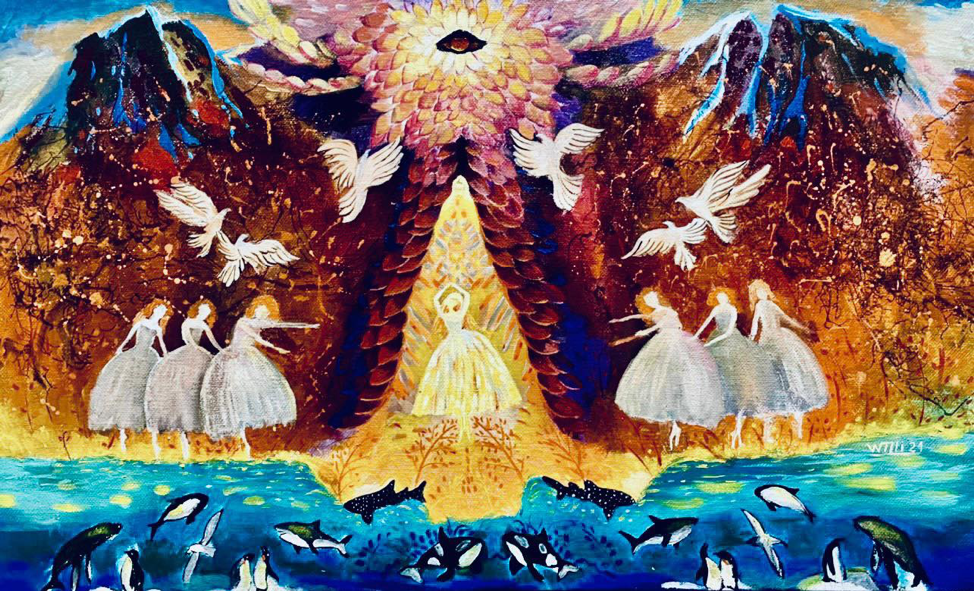
by Editor | Jun 27, 2021 | News
From Ho Chi Minh City, Vietnam, artist Will Pham sent the letter and his piece “Dance in Mercy” to Governor Michael Dukakis, co-chair of the United Nations Centennial Initiative, Board of Leaders of AIWS City:
“With the dream of building a new world that is more intelligent, more efficient, more authentic, and more compassionate; a place where humankind is more affectionate to each other, a fulfilled world of wisdom, creativity, and compassion, I have dedicated many enthusiasm and knowledge, intertwined with an intense love for peace to delineate the work “The Dance in Mercy – Vu Khuc Nhan Ai” as a small gift to Humanity in general, and The United Nations Centennial Initiative in particular.
This piece was inspired by the Ballet No. 20 “Lebedinoye Ozero – Swan Lake” by Composer Pyotr Ilyich Tchaikovsky circa 1875-1876. This play is based on a Russian fairy tale as well as an old German tradition, about Odette, a princess who is cursed to be transformed into a swan, and when she finds her love, Siegfried; their true love, broke the curse, making not only the other swans transformed into humans but also Siegfried and Odette, under the vision of these beautiful swans, were flying together to heaven, vowing to be together forever after.
“The Dance in Mercy” will be a painting filled with positive energy wherever it is displayed. When other people observe this painting, I aspire to not only perceive this energy, but their sense of vision will be overwhelmed by the rich colors from the piece, and so on, the message of peace that I want to deliver will appear. I feel immensely honored and appreciative to be a part of the 100th anniversary of The United Nations. From the bottom of my heart, I wish that through this memorable opportunity, my team and I will have a durable relationship with The United Nations; and together we will take a step closer to our peaceful world, spreading positive messages via art to all human beings. Additionally, in my humble opinion, my brainchildren, which are my works of art, will be approached more widely by the public, expanding indefatigable positive energy, the truthful meaning of life, and most importantly, supporting human peace.
“Let’s reach for the sky, even if we cannot pick the brightest star, at least we can stand among the stars to light our dreams.”
I dedicate this work to The United Nations Centennial Initiative.”
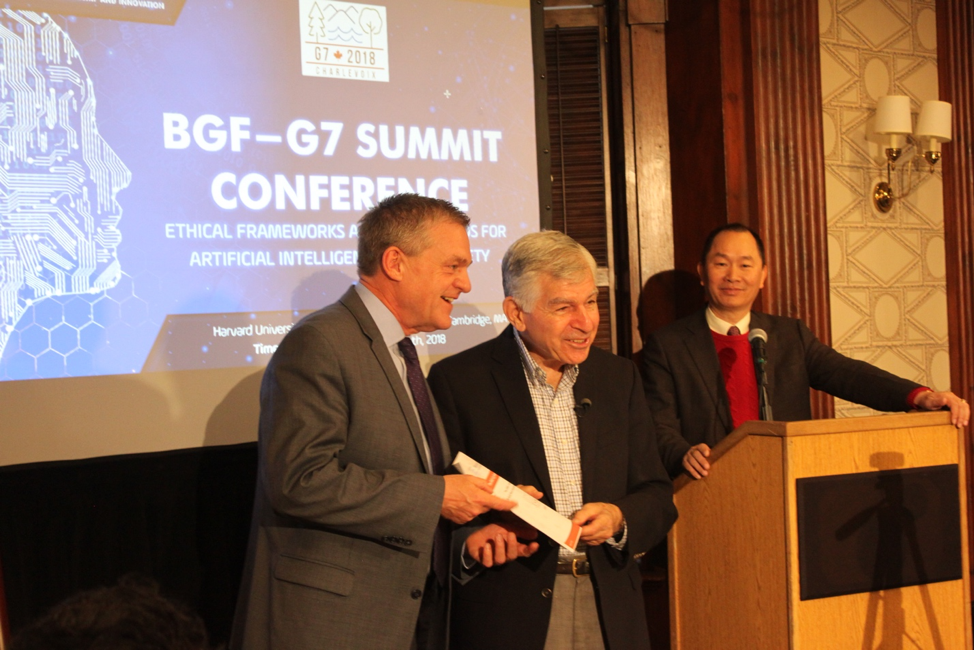
by Editor | Jun 27, 2021 | Statements, News
The leaders of the G7 met in Cornwall on 11-13 June 2021, released statements and releases, some about the digital sphere and AI. Here are some notes:
We call on the private sector to join us in our efforts and reaffirm our support for industry-led inclusive multi-stakeholder approaches to standard setting, in line with our values and principles which underpin these standards. As such, we welcome the Presidency’s initiative of a ‘Future Tech Forum’ in September 2021 with the support of the OECD. The Forum will convene like-minded democratic partners to discuss the role of technology in supporting open societies and tackling global challenges.
We support the aim to facilitate dialogue between governments, industry, academia, civil society and other key stakeholders. As such we will continue to take bold action to build more transparency in our technologies, building on the Open Government Partnership. Building on the work of the Global Partnership for Artificial Intelligence (GPAI), we will aim to rally all partners around our open and human centric approach to artificial intelligence looking forward to the GPAI Summit in Paris in November 2021. To support effective standard-setting that reflects our core values and principles, we will strengthen our coordination, including by consulting with industry, with regards to engagement with and appointments to Standard Developing Organisations, where appropriate. We commit to better sharing of information and best practice, including between our national standards bodies, enhanced capacity building and support for multi-stakeholder participation in standard-setting. To this end, we endorse the Framework for G7 Collaboration on Digital Technical Standards.
On September 7-9, 2021, Boston Global Forum and Club de Madrid will co-organize the Policy Lab “Fundamental Rights in AI & Digital Societies: Towards an International Accord”, in which participants will contribute initiatives and action plans for leaders and governments of G7 and for GPAI Summit.
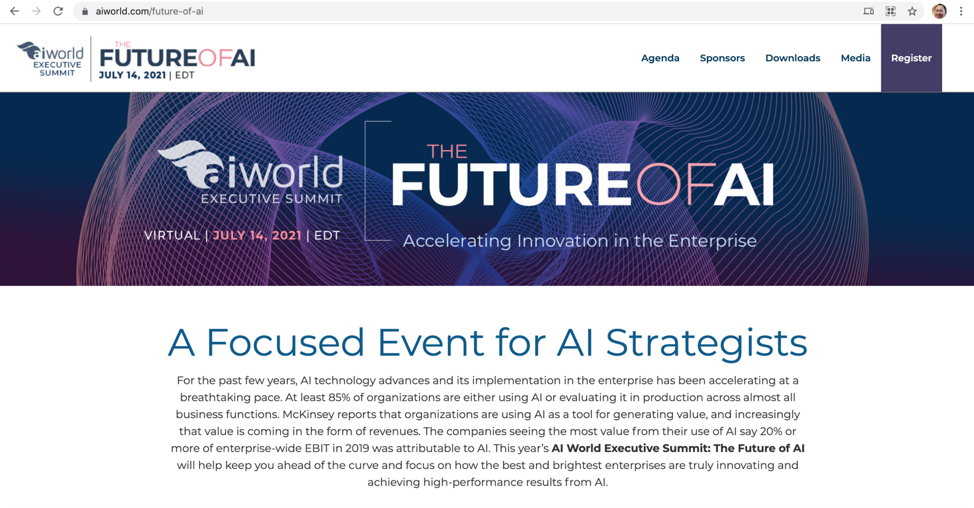
by Editor | Jun 27, 2021 | Event Updates
July 14, 2021, 2:40 PM – 3:15 PM EDT
EXECUTIVE ROUNDTABLE: Vision for the AI Age through 2045
Our distinguished panel and co-authors will debate and present a vision of an all-digital virtual city based on trusted open data. This presentation will summarize the standards and research developed by these experts and delivered in a series of reports to the United Nations on behalf of the AI World Society of the Boston Global Forum. The series of reports have been published and presented to the U.N. in the last year and half, and includes specific plans covering:
Social Contract for the AI Age
- People Centered Economy
- Trustworthy Economy
- Intellectual Society, a Thoughtful Civil Society, and
- AI Government
- AIWS City
- Thomas Patterson, PhD, Research Director, The Michael Dukakis Institute for Leadership and Innovation; Professor of Government and the Press, Harvard Kennedy School; President, AIWS University
- Panelists:
- Vint Cerf, Father of the Internet, Chief Internet Evangelist, Google
-
- Michael Dukakis, Governor; Co-Founder and Chair, AI World Society (AIWS); Boston Global Forum
-
- Ramu Damodaran, Chief, United Nations Academic Impact, United Nations; Editor in Chief, United Nations Chronicle Magazine
AI World Executive Summit focus on AI Strategists
For the past few years, AI technology advances and its implementation in the enterprise has been accelerating at a breathtaking pace. At least 85% of organizations are either using AI or evaluating it in production across almost all business functions. McKinsey reports that organizations are using AI as a tool for generating value, and increasingly that value is coming in the form of revenues. The companies seeing the most value from their use of AI say 20% or more of enterprise-wide EBIT in 2019 was attributable to AI. This year’s AI World Executive Summit: The Future of AI will help keep you ahead of the curve and focus on how the best and brightest enterprises are truly innovating and achieving high-performance results from AI.
Link:
https://aiworld.com/future-of-ai
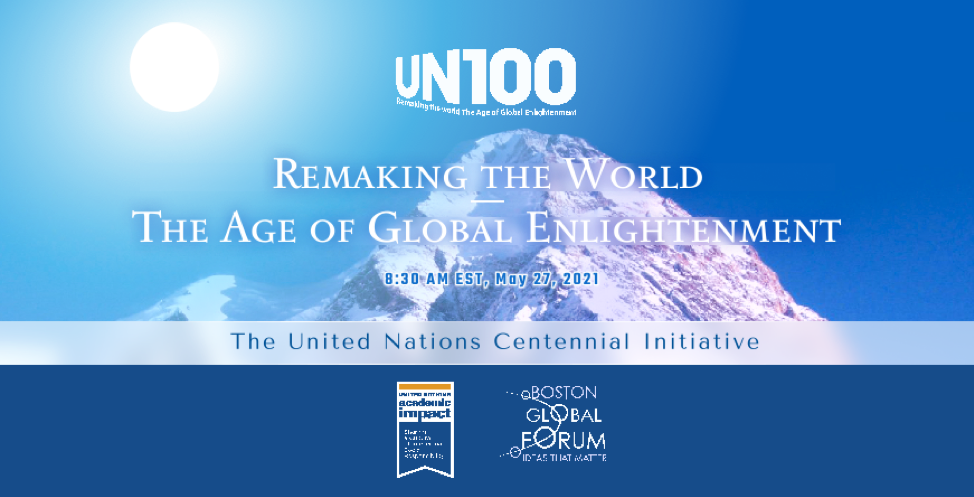
by Editor | Jun 27, 2021 | News
Nazli Choucri, Professor of Political Science (MIT) and co-author of Social Contract for the AI Age, contributes to the book Remaking the world – The Age of Global Enlightenment.
She wrote about the Framework for AI International Accord; some notes are here below:
Consistent with the principles the provisions of the Budapest Convention on Cybercrime as well as the EU General Directives, and respecting the Social Contract for the AI Age, the AIIA draft framework is conceived and designed as: 10
- A multi-stakeholder, consensus-based international agreement to establish common policy and practice in development, use, implementation and applications of AI
- Anchored in the balance of influence and responsibility among governments, businesses, civil society, individuals, and other entities.
- Respectful of national authority and international commitments and requires assurances of rights and responsibilities for all participants and decision-entities.
To consolidate the design into a formal International Accord, it is essential to:
- Review legal frameworks for AI at various levels of aggregation to identify elements essential for an international AI legal framework.
- Recognize methods to prevent abuses by governments and businesses in uses of AI, Data, Digital Technology, and Cyberspace (including attacks on companies, organizations, and individuals, and other venues of the Internet)
- Consolidate working norms to manage all aspects of AI innovations, and
- Construct and enable response-systems for violations of rights and responsibilities associated with the development, design, applications, or implementation of AI



by Editor | Jun 27, 2021 | Publications
Ramu Damodaran, Chief of the United Nations Academic Impact
New York, May 26, 2021
I must have been in the eighth grade when our high school teacher, Father Pat Rebeiro, introduced us to the distinction between culture and civilization which the French author Amaury de Riencourt had put forward some years earlier, in which he expanded upon the idea put forward by Oswald Spengler earlier in The Decline of the West that, as Ben Espen has paraphrased it, “civilization is the “late” phase in a society’s life. It follows the period of “Culture,” when society creates its characteristic science, religion, art, and politics. “Espen goes on to suggest that “culture is pioneering, aesthetic, and fertile. Civilization is sterile, extensive, practical, and ethical.”
Riencourt wrote in the 1950s, shortly before Sputnik bridged our inner and outer worlds, and before the extraordinary demonstrations of a world resurgent, a world “pioneering, aesthetic and fertile” demonstrated the futility of demarcating cultures and civilizations by national or continental boundaries. Migration, the ease of collaborative research beyond the physical proximity of the researchers, and the unexpected fertility of foreign lands to greatnesses once thought indigenous to a specific national home, have allowed us a world whose civilizational moulding and moorings constantly yield a chorus, a confluence, and, indeed, a co-mingling, of cultures. Where, in this excitement and effervescence, does artificial intelligence (AI) fit in?
A good point to begin that reflection is the assertion by Governor Michael Dukakis of the character of AI, the absence of its applicability to the “too many judgments you have to make in this world that involve values, ethics and morality.” As bedrock principles, these would appear civilizational in character, the enduring geology which cultures infused but never supplanted, cultures which by the very being of their energy and spontaneity could well ignore, go beyond, reinvent —-or, yes, conform to —- values, ethics and morality. Speaking in Ho Chi Minh city (HCMH) two years ago, Ousmane Dione, World Bank Country Director for Vietnam, noted that while “ AI mimics how the brain works “, there were three key factors to measure the possibilities of its successful use in that historic city ; “setting clear and realistic expectations for where and how AI can deliver for HCMC, ensuring that there is an enabling environment for AI to succeed in practice, especially when it comes to accessing and integrating the data needed to solve the city’s challenges and, finally, making sure that we understand and manage any key risks associated with AI.”
Within the cultural space, the most self-evident area of risk posed by AI is, as Baptiste Caramiaux has written, in the challenge by “AI-generated content to authorship, ownership and copyright infringement. New exclusive rights on datasets must be designed in order to better incentivise innovation and research.” That said, as he continues, “AI challenges the creative value-chain in two ways: shifting services performed by humans to algorithms and empowering the individual creator.” It is that empowerment that will, in my view, remain one of the two greatest possibilities for AI to enhance the individual, as much as global, cultural experience.
In 2016, Microsoft, with academic and corporate partners, launched the “Next Rembrandt” project which “imprinted the AI “with 346 of Rembrandt’s known works in the hopes that it could create a unique 3D printed image in his style. An algorithm measured the distances between the facial features in Rembrandt’s paintings and calculated them based on percentages. Next, the features were transformed, rotated, and scaled, then accurately placed within the frame of the face. Finally, we rendered the light based on gathered data in order to cast authentic shadows on each feature.” The cumulative result was a product that could well have been the final work by the storied artist of the Renaissance.
Using that illustration as metaphor, one can foresee the power and possibilities in AI to create cultural experiences beyond ready human capacity, through its innate strengths of recognition, selection and assimilation, experiences that can extend to the creative and performing arts, the auditory aspiration of recreated music (think of Beethoven’s nine symphonies being fashioned into his unwritten tenth; we have a precursor already in the 2019 venture in Linz, where a performance of Mahler’s unfinished tenth symphony was followed by a six minute software composition in his style ), or a syncretic architectural fantasy that echoes Egyptian pyramids as evocatively as it does the Angkor Wat in Cambodia. Here AI is an enhancer of, and not a threat to, human enjoyment.
Corollary to this is the expansion the judicious use of AI will afford the culturally creative individual; even if its mimicking of the human brain will not allow it to become the brain itself, and happily not, it can through that process of inference and imitation address many of the more mundane aspects of the creativity while also suggesting options and possibilities for the original human brain to explore.
The cofounding by Governor Michael Dukakis and Nguyen Anh Tuan of the Boston Global Forum (BGF) of the “Artificial Intelligence World Society” (AIWS) launched “a project that aims to bring scientists, academics, government officials and industry leaders together to keep AI a benign force serving humanity’s best interests.” The idea of an AIWS would strike a particular chord for the United Nations which had looked at the idea of a “world society” in its very first years with UNESCO’s encouragement of “teaching about the United Nations and its specialized agencies since, together, these form the greatest contemporary effort, on an international, governmental scale, to move towards a world society. A booklet including some suggestions for teaching programs on the United Nations in the schools of Member States…was considered…at the UNESCO seminar at Adelphi College, New York.”
“World society” is an elegant phrase that has not acquired the reiteration it deserves; I was reminded of it when reading an article by Robert A. Scott, President Emeritus of Adelphi, where he writes “One of the most important goals of education is to learn how to reflect, how to learn from our experiences. An early experience that has stayed with me was finding small wooden signs along the paths of the camp I attended when nine years old. The signs were about three inches by seven inches and had the word “Others” carved into the wood. They were intended to inspire those walking the paths to be considerate of others, welcome others, and listen to others, no matter what their station in life. Others. Respect others. Listen to others, no matter what their station. Reflect on what they say. It may help solve a problem you never thought about.”
Those last four words point to the second possibility I sense in the power of AI to enhance the individual, to allow her the possibility to summon experiences untested and untasted from the moorings of the felt and familiar, to find in the ‘others’ that Bob Scott mentioned, ourselves. Much as the often irritating pop up advertisements that promise “if you like that you will love this”, AI can, with the voluntary consent of the online seeker, bring to the proximity of her desk or lap beauties unexplored with a confidence in their appeal that only objective algorithmical analysis can assure. And making distant cultures proximate, seeing their evanescent echoes in one’s own, is the essence of a world society.
The truth that such a society ought to be both a physical and a spiritual concept is reflected in what BGF describes as a “sophisticated pioneer model: a combination of the virtual, digital AIWS City and a real city”, the model being Phan Thiet in Viet Nam, developed by the Nova Group in that country whose Chairman, Bui Thanh Nhon, described it as “ the place for the World Leadership Alliance-Club de Madrid and the Michael Dukakis Institute to hold important annual events marked by the theme of ‘Building a New Economy’ for the world in the digital and artificial intelligence era, a venue to announce new achievements in the history of artificial intelligence and the digital economy.” It is critical to acknowledge the cultural dimension to the “new economy” through the creative sector, so much of its component cultural; as UNESCO notes, it generates “annual revenues of US$2,250 billion and global exports of over US$250 billion. According to recent forecasts, these sectors will represent around 10% of global GDP in the years to come.”
Speaking at the Riga Conference 2019 in Latvia, Tuan referred to the “need for a new social contract, one that is suited to a world of artificial intelligence, big data, and high-speed computation and that will protect the rights and interests of citizens individually and society generally. A fundamental assumption of the social contract is that the five centres of power – government, citizens, business firms, civil society organizations, and AI assistants – are interconnected and each needs to check and balance the power of the others. Citizens should have access to education pertaining to the use and impact of AI,” a thought reflective of what Governor Dukakis said at a BGF March event, of the possibilities of “new ideas, initiatives, and solutions by thinkers and creators in an effort to build a civilized, prosperous, peaceful, and happy world,” ‘creators’ an apt term to define those who say their skills and talent enhanced, and not threatened by, AI.
Forty years ago, Carl Sagan wrote: “What an astonishing thing a book is. It’s a flat object made from a tree with flexible parts on which are imprinted lots of funny dark squiggles. But one glance at it and you’re inside the mind of another person, maybe somebody dead for thousands of years. Across the millennia, an author is speaking clearly and silently inside your head, directly to you. Writing is perhaps the greatest of human inventions, binding together people who never knew each other, citizens of distant epochs. Books break the shackles of time. A book is proof that humans are capable of working magic.”
AI has taken that proof a step further, affirming in the process the linear connection between human capability and magic, affirming that magic would not find itself possible of realization without the humans that shaped it, extending inexorably and wondrously the pledge in the United Nations charter to the “dignity and worth of the human person” whose measure only the human person herself, through innovation, experiment and daring, can expand.
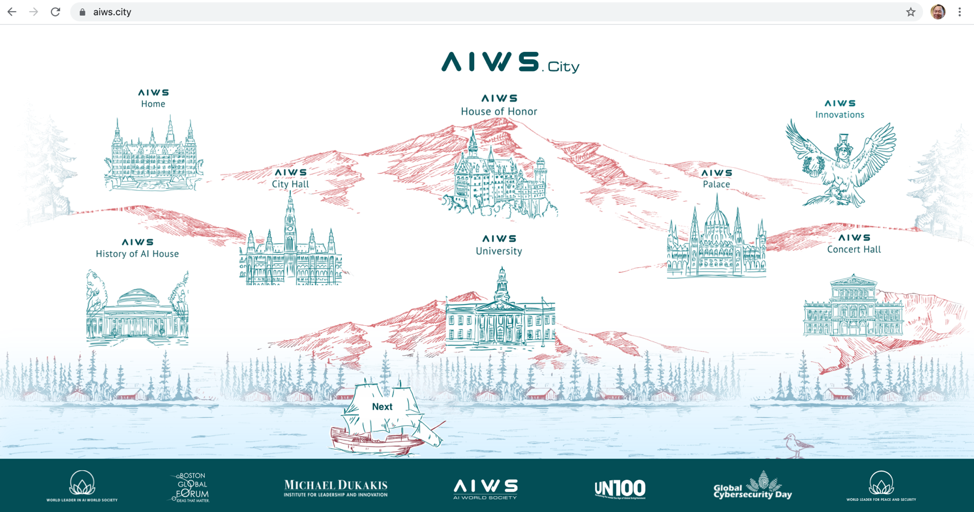
by Editor | Jun 20, 2021 | News
This plan is introduced in the book Remaking the World – The Age of Global Enlightenment:
Implementing the AIWS innovative ecosystem in society:
Based on AIWS innovative value system, building AIWS creative, innovative economic and political ecosystem for every citizen can create AIWS values and help exchange and trade AIWS value in social, include:
– Developing valuing criteria of AIWS creative, innovative contain 12 criteria of innovations.
– Building a AIWS Global Creative – Innovative Exchange Platform
– Building a AIWS Global Enlightenment Education System
– The State builds a strict and transparent legal system to protect creative, innovative values.
– The cultural and psychosocial environment supports and promotes innovation and compassion, tolerance, noble.
AIWS City as a Test Model:
Building AIWS City, a digital and virtual city as an experiment of the AIWS Global Innovation Ecosystem, including:
- AIWS value system: each citizen has an account as a digital house for creativity and exchange and trade their innovations.
- AIWS Global Innovation Exchange.
- AIWS University tests the innovative global citizenship education system AIWS
- AIWS City’s online advantage to create a stimulating environment for creativity and noble life includes theatres, concert auditoriums, museums, palaces, old towns, parks, and stadiums.
- Building innovative communities of AIWS City










